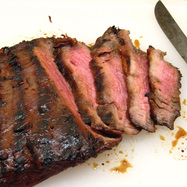 A recent study published in the prestigious scientific journal Nature Medicine has sent waves through the natural health community by linking L-carnitine, a nutrient in red meat, and heart disease.1 L-carnitine has recently been approved for public use by health Canada and has a large body of research supporting its health benefits. There is research supporting its use in heart disease chronic fatigue syndrome, infertility, erectile dysfunction, chronic obstructive pulmonary disease (COPD), diabetes. Some of the more specific cardiovascular benefits include increased survival after heart failure, increased exercise tolerance in patients with chronic angina, decreased total cholesterol and increased HDL cholesterol patients with hypertension and improvement in muscle recovery after exercise.2-5 How can such a well-studied nutrient all of a sudden cause the very thing that many integrative doctors and patients use it to prevent and even treat? As with all new research, a closer look is required at the conclusions and methods from the study. Just a brief scan of the abstract and title shows that the intent of the study was not to highlight the negative effects of carnitine but rather show the significance of gut bacteria on the metabolism of cartinine and the possible link to cardiovascular disease. “Intestinal microbiota metabolism of L-carnitine, a nutrient in red meat, promotes atherosclerosis.” The study reported that specific strains of bacteria in mice converted L-carnitine to trimethylamine-N-oxide (TMAO) a compound linked to the formation of atherosclerosis. Furthermore, if mice that were pretreated with antiobiotics (which killed the gut bacteria) did not product TMAO suggesting that the specific strains of bacteria in the gut were the problem. The only human evidence portion of the study reported that people with higher plasma L-carnitine levels predicted increased risks for cardiovascular disease. While it is easy or convenient to scan the title and summary of the study and conclude that L-carnitine increased the chance of heart disease but it simply does not say that. There is no doubt that vegetarians have a lower rate of heart disease but this study does not prove that L-carnitine from meat causes the problem. It simply shows that your intestinal bacteria can have an effect on the metabolism of nutrients and possibly alter the effects in the body. This actually is not a new concept. Emerging research has linked probiotics and gut flora to seemly unrelated conditions such as obesity, depression, allergies and inflammation. Interestingly, a recent study showed an increase in TMAO levels, foam cell formation and aortic atherosclerosis in mice that were fed phosphatidyl choline (PC), a nutrient commonly used to address cardiovascular conditions. Again, these observations were dependent upon specific gut flora.6 Another important point to remember is that the bacteria found in digestive system of mice varies greatly from that in humans so its premature to extrapolate the results. We should also consider that a diet high in red meat (which also happens to be high in carnitine) may have other negative effects on heart disease independent of carnitine. The human portion of the study showed people with higher plasma L-carnitine levels predicted increased risks for cardiovascular disease however this does not prove cause and effect. There are many things (saturated fat, environmental toxins etc.) found in red meat that can have a negative effect on cardiovascular health. L-carnitine may just be acting as a “biomarker” of red meat consumption rather than the culprit. When considering new and emerging research it is always prudent to proceed slowly and carefully before drawing broad conclusions. The study discussed above highlights this perfectly and unfortunately media outlets like the New York Times splashed misleading headlines all over North America.7 Its does not show any definitive link between L-carnitine use and heart disease however it does demonstrate that there is a link between our gut bacteria, the formation of potentially harmful compounds that maybe linked to diseases. It also highlights that we need to continue to study nutrients like L-carnitine to fully understand how it is used and metabolized in the body. Based on the conclusions we can say that a person with existing heart disease should consider a move towards a more vegetarian or plant based diet (not just to avoid carnitine) and explore ways to promote a healthy gut flora. In Health, Dr Paul Hrkal References: 1) Koeth RA, Wang Z, Levison BS, et al. Intestinal microbiota metabolism of L-carnitine, a nutrient in red meat, promotes atherosclerosis. Nature Med. 2013;19(5):576-585. 2) Cherchi A, Lai C, Angelino F, et al. Effects of L-carnitine on exercise tolerance in chronic stable angina: a multicenter, double-blind, randomized, placebo controlled crossover study. Int J Clin Pharmacol Ther Toxicol. 1985;23(10):569-572. 3) Cacciatore L, Cerio R, Ciarimboli M, et al. The therapeutic effect of L-carnitine in patients with exercise-induced stable angina: A controlled study. Drugs Exp Clin Res. 1991;17(4):225-235. 4) Mancini M, Rengo F, Lingetti M, Sorrentino GP, Nolfe G. Controlled study on the therapeutic effect of propionyl-L-carnitine in patients with congestive heart failure. Arzneimittelforschung. 1992;42(9):1101-1104. 5) De Pasquale B, Righetti G, Menotti A. L-carnitine for the treatment of acute myocardial infarct. Cardiologia. 1990;35(7):591-596. 6) Wang Z, Klipfell E, Bennett BJ, et al. Gut flora metabolism of phosphatidylcholine promotes cardiovascular disease. Nature. 2011;472(7341):57-63. 7) Kolata G. Culprit in heart disease goes beyond meat’s fat. The New York Times. http://www.nytimes.com/2013/04/08/health/study-points-to-new-culprit-in-heart-disease.html?pagewanted=all&_r=0. Accessed june 26 2013.
1 Comment
9/3/2021 01:06:43 am
Hi. Thank you for sharing this very informative and useful article. Btw. I wanna share my experience about Genuine Haarlem Oil for Human since when I was started to using it for my health problems. Their products are very helpful both human and animals good for immune system booster.
Reply
Leave a Reply. |
Welcome To My Blog
My goal is to post thought-provoking and informative articles so you can learn and apply the latest news from the world of natural health. Feel free to post comments and start a conversation. Stay tuned to my twitter and facebook feeds for the latest posts.
Archives
December 2015
|

 RSS Feed
RSS Feed

